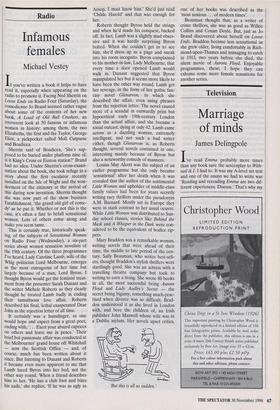Radio
Infamous females
Michael Vestey
If you've written a book it helps to have read it, especially when appearing on the radio to promote it. Facing Ned Sherrin on Loose Ends on Radio Four (Saturday), the comedienne Jo Brand seemed rather vague about some of the contents of her new book, A Load of Old Ball Crushers, an irreverent look at 50 famous or infamous women in history; among them, the two Elizabeths, the first and the Taylor, George Eliot, a pickpocket called Moll Cutpurse and Boadicea.
Sherrin said of Boadicea, 'She's sup- posed to be buried under platform nine of, is it King's Cross or Euston station?' Brand had no idea. Under Sherrin's cross-exami- nation about the book, she took refuge in a story about the first escalator recently Installed on the Isle of Wight and the won- derment of the citizenry at the arrival of this daring new invention. Sherrin thought she was now part of the show business Establishment, 'the grand old girl of come- dy' as he put it. Whether or not this is the case, it's often a fate to befall sensational women. Lots of others come along and make you seem tame.
. This is certainly true, historically speak- ing, of the subjects of Sensational Women on Radio Four (Wednesday), a six-part series about women sensation novelists of the 19th century. Of the three programmes I've heard, Lady Caroline Lamb, wife of the Whig politician Lord Melbourne, emerges as the most outrageous of her time but largely because of a man, Lord Byron. I thought Byron would get the feminist treat- ment from the presenter Sarah Dunant and the writer Michele Roberts as they clearly thought he treated Lamb badly in ending their tumultuous love affair. Roberts described his final, lethal exasperated Dear John as the rejection letter of all time.
It certainly was a humdinger, as one would hope and expect from a great poet, ending with, `... Exert your absurd caprices on others and leave me in peace.' Their brief but passionate affair was conducted at the Melboumes' grand house off Whitehall — now the Scottish Office — and, of course, much has been written about it since. But listening to Dunant and Roberts it became even more apparent to me that Lamb lured Byron into her bed, not the other way round. When a friend describes him to her, 'He has a club foot and bites his nails,' she replies, 'If he was as ugly as Aesop, I must know him.' She'd just read 'ChiIde Harold' and that was enough for her.
Roberts thought Byron held the strings and when he'd made his conquest, backed off. In fact, Lamb was a slightly mad obses- sive and it was hardly surprising Byron bolted. When she couldn't get in to see him, she'd dress up as a page and sneak into his room incognito. Byron complained to his mother-in-law, Lady Melbourne, that every time a door opened Lamb would walk in. Dunant suggested that Byron manipulated her but it seems more likely to have been the other way round. Lamb got her revenge, in the form of her gothic fan- tasy novel Glenarvon, in which she described the affair, even using phrases from the rejection letter. The novel caused more of a scandal in outwardly prim but hypocritical early 19th-century London than the actual affair, and she became a social outcast, dying at only 42. Lamb came across as a dazzling woman, extremely intelligent, and not such a bad writer either, though Glenarvon is, as Roberts thought, several novels contained in one, interesting mainly because of Byron but also a noteworthy comedy of manners.
Louisa May Alcott was the subject of an earlier programme but she only became 'sensational' after her death when it was revealed that the author of the sentimental Little Women and upholder of middle-class family values had been for years secretly writing racy thrillers under the pseudonym A.M. Barnard. Mostly set in Europe they were in stark contrast to her usual oeuvre. While Little Women was distributed to Sun- day school classes, stories like Behind the Mask and A Whisper in the Dark were con- sidered to be the equivalent of bodice rip- pers.
Mary Braddon was a remarkable woman, writing novels that were ahead of their time, the middle to late period of the cen- tury. Sally Beauman, who writes best-sell- ers, thought Braddon's stylish thrillers were startlingly good. She was an actress with a travelling theatre company but took to writing to earn a living. She wrote 80 books in all, the most successful being Aurora Floyd and Lady Audley's Secret — the secret being bigamy, something much-prac- tised when divorce was so difficult. Brad- don understood it as she lived in London with, and bore the children of, an Irish publisher John Maxwell whose wife was in a Dublin asylum. Her novels upset critics, 'But this is all so sudden.' one of her books was described as the 'most noxious ... of modem times'.
Beauman thought that, as a writer of crime thrillers, she was as good as Wilkie Collins and Conan Doyle. But, just as Jo Brand discovered about herself on Loose Ends, Braddon became less sensational as she grew older, living comfortably in Rich- mond-upon-Thames and managing to catch in 1913, two years before she died, the silent movie of Aurora Floyd. Enjoyable programmes, these; I hope they can exhume some more female sensations for another series.


















































































 Previous page
Previous page